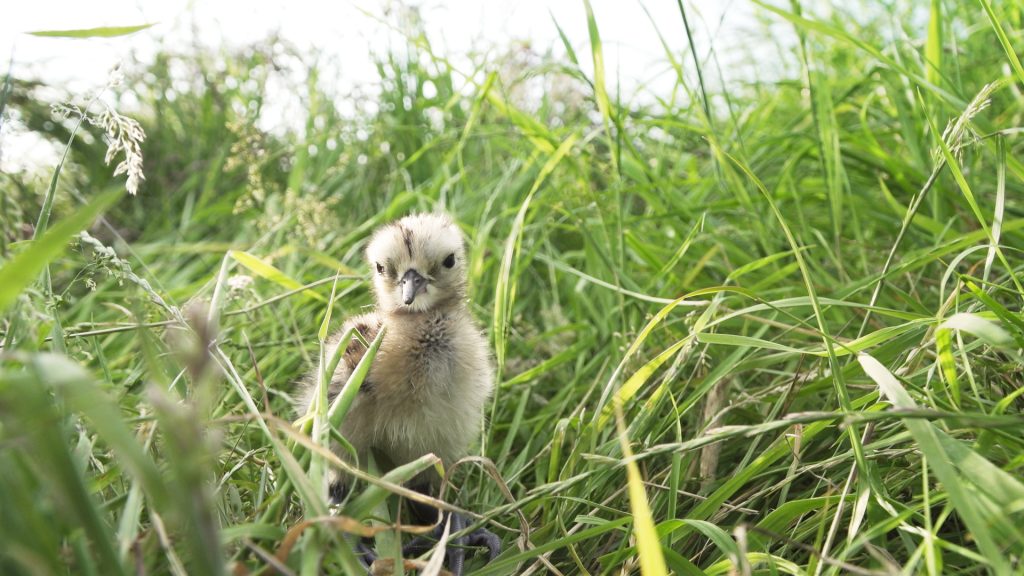Read part 1 of this blog here…
A national shortage of mealworms started to present us with some real concerns. The two largest UK suppliers had suffered unfortunate incidences at a crucial time, one suffering a fire and another a power failure. By banding together and rushing across the county to collect small quantities of food we were able to keep the chicks fed. Mealworms were donated by Wiggly Wigglers to get us off to a good start. Further help from them and other firms came in the form of alerting us to deliveries and saving them for us, even leaving them with security guards, averted would could have been a severe crisis.
 Through all the ups and downs, we had with us West of England Uni wildlife film student, Billy Clapham. His preferred subject was farmers relationships with curlew, and although he could have been a distraction from core work, Billy was immediately slotted in as a welcome member of the team. He even managed to charm our (late stage season) tired and grumpy ornithologist. The curlew chicks that he spent weeks following were sadly lost before they could fledge, with the cause of loss unclear. Although heartbreaking, this gave his film a realistic twist, and his finished film accurately portrays the story of farmers and the fate of ‘their’ curlew. Billy turned out to be the best lodger ever, understanding that I was often too tired to speak or cook at the end of the day, and nearly displaced my less well-trained son. He even found a curlew nest! (Watch Keeper of the Call here).
Through all the ups and downs, we had with us West of England Uni wildlife film student, Billy Clapham. His preferred subject was farmers relationships with curlew, and although he could have been a distraction from core work, Billy was immediately slotted in as a welcome member of the team. He even managed to charm our (late stage season) tired and grumpy ornithologist. The curlew chicks that he spent weeks following were sadly lost before they could fledge, with the cause of loss unclear. Although heartbreaking, this gave his film a realistic twist, and his finished film accurately portrays the story of farmers and the fate of ‘their’ curlew. Billy turned out to be the best lodger ever, understanding that I was often too tired to speak or cook at the end of the day, and nearly displaced my less well-trained son. He even found a curlew nest! (Watch Keeper of the Call here).
People from across the UK, and even Europe, regularly contact us for advice and help. Advice sought can span subjects such as setting up farmer-led projects, nest monitoring and protection, headstarting, and arts and engagement activities. These requests can be overwhelming, and despite our best efforts to help we are a small project with limited capacity. Some queries have been solved by the Curlew Observation Training Film, produced in partnership with the British Trust for Ornithology. The film was completed in 2018 and has had a great reception from those that have watched it. We also get frequent invitations to speak about our work, including a royal invitation from Prince Charles!

The politics of competitive funding for conservation became starkly apparent as we tried to raise funds for the continuation of project work. We are not on the radar of usual local NGO and policy maker networks. We find it hard to make our voice heard and sound credible unless someone comes to see what we have achieved. Positive collaborations with people such as Dr Geoff Hilton of the Wildfowl and Wetlands Trust, Dr Rachel Taylor from the BTO, Curlew Forum members and GWCT staff have supported us when we’ve needed help. Carnyx Wild delivered their ‘above and beyond’ support for Curlew Cam, with the help of Secure Web Services. Volunteers from the Landscape Partnership Scheme returned to help the project and two new local trusts made a commitment to support Curlew Country.
The vision of conservation at landscape scale, through grass-roots up partnerships managing for waders, is really starting to take shape.
We have always respected the desires of our farming partners to do more for the environment andrecognised their struggles to do this under the pressure of general ongoing demands for cheap food. At the end of 2018 a group of Welsh farmers with whom we have worked got together and bid for a Sustainable Management Scheme. They have been one of only 8 successful applicants out of over 50. Managing for waders as ‘indicator’ species will deliver greater environmental benefits such as soil and water quality, along with consideration of other species and habitats. Managing for waders may be overlooked as being costly, but when the full benefits are realised it will seem cheap.
[paypal_donation_button]
Back to Curlew Country Blog Posts here…
